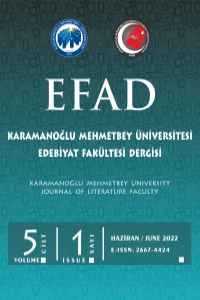Huxley’in Cesur Yeni Dünya’sı Üzerine Türkiye’de Yazılan Akademik Çalışmalar: Bir Meta-Analiz Çalışması
Cesur Yeni Dünya, Aldous Huxley, Meta-analiz, Nicel Araştırma
Academic Studies Written in Türkiye on Huxley’s Brave New World: A Meta-Analysis Study
Brave New World, Aldous Huxley, Meta-analysis, Quantitative Research,
___
- Alım, E. (2019). Sovereign Power, Disciplinary Power and Biopower: How to Make Sense of Foucault’s Conceptualization Of Power Mechanisms? Artuklu Kaime Uluslararası İktisadi ve İdari Araştırmalar Dergisi, 2(1), 13-24.
- Balcı, A. (2012). Türkiye’de Çocuk Edebiyatı Üzerine Hazırlanan Lisansüstü Tezler Hakkında Bir Meta-Analiz Çalışması/A Meta-Analysis Study on Post-Graduate Theses Written on Children’s Literature In Turkey. Mustafa Kemal University Sosyal Bilimler Enstitüsü Dergisi, 9(17), 195-206.
- Basu, B., Broad, K. R., & Hintz, C. (Eds.). (2013). Contemporary dystopian fiction for young adults: Brave new teenagers (ss. 1-18), New York, Routledge.
- Borenstein, M., Hedges, L. V., Higgins, J. P. T., & Rothstein, H. R. (2009). Introduction to Meta-Analysis (ss. xxi-xxviii), Oxford, John Wiley & Sons Incorporated.
- Çakmak, Z. & Taşkıran, C. (2020). Türkiye’de Sosyal Bilgiler Eğitimi Alanındaki Çalışmaların Analizi: Bir Meta Sentez Çalışması. Uluslararası Türkçe Edebiyat Kültür Eğitim (TEKE) Dergisi, 9(3), 1243-1261.
- Çelebi, C., Ergül, E., Usta, B., & Mutlu, M. (2019). Türkiye’de Yabancılara Türkçe Öğretimi Alanında Hazırlanmış Lisansüstü Tezler Üzerine Bir Meta-Analiz Çalışması. Temel Eğitim,1(3), 39-52.
- Cesur, K. (2022). Content analysis of research articles on teaching English to young learners in Türkiye. RumeliDE Dil ve Edebiyat Araştırmaları Dergisi, (29), 889-903.
- Çopur, Y. (2020). Adalet Ağaoğlu Üzerine Hazırlanan Lisansüstü Tezler Hakkında Bir Meta-Analiz Çalışması. Turkish Studies - Language and Literature. 15(4), 1747-1759.
- Çörekçioğlu, H. (2016). Biz ve Cesur Yeni Dünya’da İlkelcilik. Folklor/Edebiyat, 22(86), 93-108.
- Demerjian, L. M. (2016). Dystopia and the Promethean Nightmare. R. Barton (Ed.), The age of dystopia: One genre, our fears and our future (5-18), Newcastle upon Tyne, Cambridge Scholars Publishing.
- Dinçer, S. (2018). Content analysis in scientific research: Meta-analysis, meta-synthesis, and descriptive content analysis. Bartın University Journal of Faculty of Education,7(1), 176-190.
- Göçer, A. & Arslan, S. (2018). Türkiye’de Dil Bilgisi Öğretimi Üzerine Hazırlanan Lisansüstü Tezler Hakkında Bir Meta Analiz Çalışması. Kırıkkale University Sosyal Bilimler Dergisi, 8(1), 107-122.
- Haidich A. B. (2010). Meta-analysis in medical research. Hippokratia, 14(Suppl 1), 29–37.
- Huxley, A. (1946). Brave New World. New York, Harper & Row.
- Keisman, M. (2016). Power and Control in Brave New World and 1984. Prologue: A First-Year Writing Journal, 8(1), 4.
- Matter, W. W. (1975). The Utopian Tradition and Aldous Huxley. Science Fiction Studies, 146-151. Merriam-Webster. Utopia. Retrieved November, 27, 2022 from https://www.merriam-webster.com/dictionary/utopia
- Morris, J. M., Kross, A. L. (Ed.). (2009). The A to Z of utopianism. Maryland, Scarecrow Press.
- Reiff, R. H. (2009). Aldous Huxley: Brave New World (ss.7-8), New York, Marshall Cavendish.
- Vieira, F. (2010). The concept of utopia. Gregory Claeys (Ed.), The Cambridge companion to utopian literature (ss.3-27), Cambridge, Cambridge University Press.
- Watson, R. (2015). Quantitative research. Nursing Standard, 29(31), 44–48.
- Zhang, Y. & Wildemuth, B. M. (2009). Qualitative Analysis of Content. In B. M. Wildemuth (Ed.). Applications of Social Research Methods to Questions in Information and Library Science, (pp. 1-12). Libraries Unlimited.
- Yayın Aralığı: Yılda 2 Sayı
- Başlangıç: 2018
- Yayıncı: Karamanoğlu Mehmetbey Üniversitesi
Nazli GÜNDÜZ, Aslı Nur KAHRAMAN, Sinem Begüm KARAKUŞ, Yaren ÖZDEĞER
İran Sinemasında Minimalizm Örneği
Bozkır Barajı Havzasında Yer Alan Köylerde Bitki Adlarından Oluşan Yer Adları
Halime Yücel, (2021) İmgeden Yoruma
Çin’de bir Osmanlı, Nusret Ali Han Dehlevi ve ‘Çin Maçin’ Adlı Eseri (1901)
Bir Vapurunun Hazin Sonu: Teksas Vapuru Kazası (1912)
Sosyal Bilgiler Öğretmen Adaylarının Günümüz Dünya Sorunları Hakkında Durumları ve Görüşleri
Niğde Müzesi Tyana Darplı Roma İmparatorluk Dönemi Sikkeleri
Hapishanede Kadın Olmak: Gülsün Karamustafa’nın Mahkûm Kadınları
